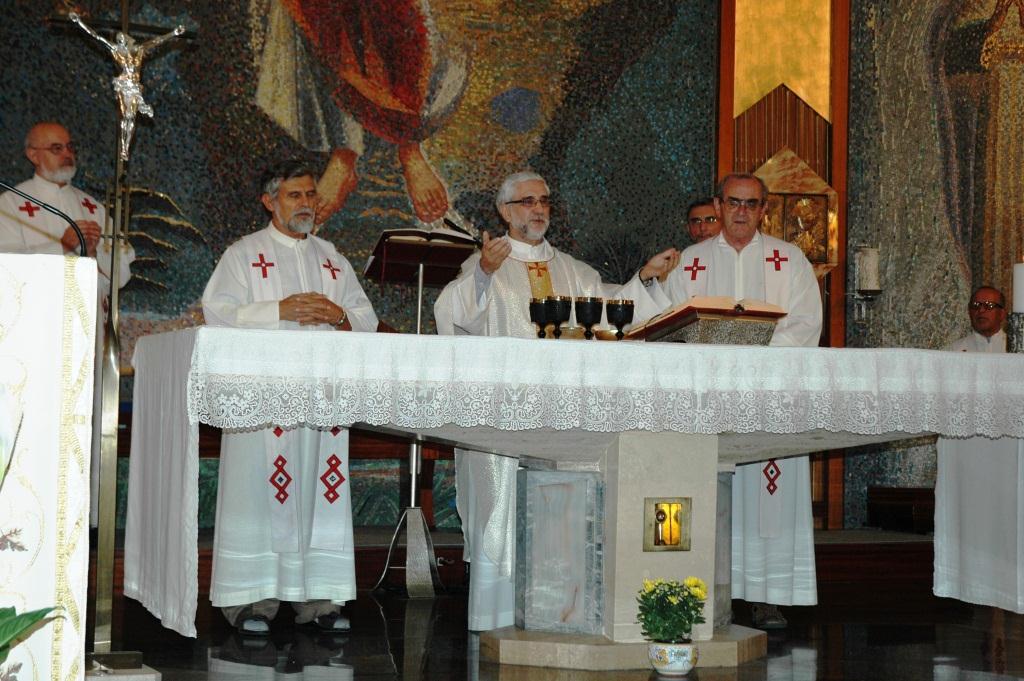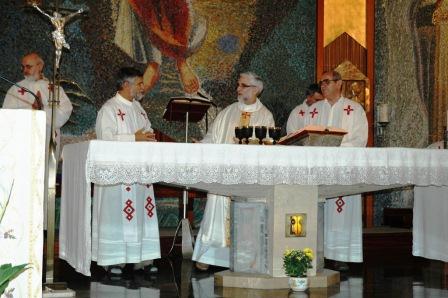Daniel Comboni
Comboni Missionaries
Institutional area
Other links
Newsletter
Rome, Saturday, September 10, 2011
Last evening, September 9, the community of the General Curia of the Comboni Missionaries celebrated the solemnity of the patron saint of our Institute: Saint Peter Claver. During the celebration of the Eucharist – presided over by the Assistant General, Fr. Antonio Villarino - the beautiful and generous figure of this great and saintly missionary, who chose to be “forever the slave of the Africans”, was highlighted. Thus we understand why St. Daniel Comboni chose to give it to all of his missionaries as a shining example of a life spent in the service of the least. Fr. Torquato Paolucci (at the right in the picture), who on this occasion was celebrating his 50th of temporary vows, concelebrated together with other confreres present in Rome, with Fr. Villarino. Prayers were offered for all the other confreres who on this day remember the anniversary of their profession and consecration to the missions.
We publish here ample excerpts from the homily of Fr. Antonio Villarino.
Solemnity of St. Peter Claver
Patron of the Comboni Missionaries
Rome 2011
Homily of Fr. Antonio Villarino
Assistant General
Last year I had the opportunity to visit Cartagena de Indias, the Colombian city along the Pacific where Peter Claver lived for a total of 44 years.
Cartagena is a beautiful, sparkling and well-kept city, with a highly developed tourist area, beautiful beaches and very modern hotels, where congresses and meetings of business people from all over the world are held. In Cartagena I could see the triumphal world of our days, just as I had seen it a few days earlier in Chicago, in Los Angeles and at Heathrow (London): so much wealth, so much technological development, so much elegance and beauty! In such an environment everything is considered normal, desirable, good. Around this socio-economic system rotate millions of people of all countries, cultures and religions – good people who live more or less well, according to how close to or how far they are from the center of the economic power.
But in Cartagena, outside the walls of the perfectly manicured historical area and the tourist quarter, the absolute expression of modernity, there are also overcrowded neighborhoods of poor people, migrants from other poor regions of Colombia, mostly Afro-Colombians, who try to survive in situations of destitution and disease, with little money, in an environment of domestic and urban violence, their human dignity having significantly been diminished. Some of them succeed in enjoying the crumbs that fall from the table of the dominant economic system, even though they cannot take part in any way in the benefits that this culture of profit and luxury offers; others can only gather the crumbs of the crumbs, that is to say, they live in subhuman conditions.
Already in the days of St. Peter Claver (1600s), Cartagena was an economically important port, with a rich class that felt it owned the right to a new growing society, a society which in totally good conscience was forcibly uprooting millions of human beings from Africa and moved them to America under horrible conditions. The society of Cartagena, even good people, did not see anything wrong in this reality: it was all part of normal life, of the laws of economy, of a busy society. There was wealth to be amassed, there was a whole world to be colonized and developed, it was imperative to move forward, humanity could not stop… The slaves were the instruments at the service of this grandiose vision of life. Was there a problem? – They were saying – you have to be realistic.
The Church was part of this society that went to Mass, educated the children in Christian values, looked for priests who would hear confessions and help eople put up with the little and not so little conflicts of life at the personal, family and social levels. Many of Peter’s Jesuit confreres were good people, professors, pastors, confessors. But only Peter could see the suffering of those men and women who reached the port more dead than alive in order to make life more livable for the city. He was the only one who took care of them, who brought them fruit, medicines, a small blanket, baptism. He did it for 44 years with great faith, perseverance and spirit of sacrifice even when, at times, his confreres did not understand him or, worse yet, did not support him. To their eyes he looked a little strange.
Reflecting on Peter Claver, I think of us today and I ask myself which part of Cartagena would we have chosen: the normal part (where were the churches, the schools, the normal people) or the part of the slaves, where there was such stench and discomfort, unheard of suffering and even so much death?
Comboni, like Peter Claver, chose that share of humankind which in his own time was considered the poorest and most abandoned. He too was a little strange. Why choose far way Africa when there was so much to in Italy?
But Peter and Comboni acted as true disciples of the Master of Nazareth, who introduced his mission with the prophetic words of Isaiah: “The Spirit has sent me to preach the Good News to the poor, and to the captives freedom.”
This is the text that the last General Chapter has chosen as the basis for the topic on mission. It is the same text we find in the Mass of St. Daniel Comboni. It is, therefore, an important text for all of us Comboni Missionaries.
Just as it did with St. Peter Claver, for Comboni and for Jesus, the Spirit pushes us towards the poor members of humankind. Just as in the day of Peter, of Comboni and of Jesus, not everyone understands this choice, not even church people and, at times, not even many of our confreres.
On the other hand, in the life of St. Peter Claver, just as in the life of Comboni, there are some principles of Comboni methodology, that are repeated in our documents. I would like to highlight three of them:
- It is necessary to move, to make geographical and sociological choices, to take very concrete decisions that will place us at the margins with the victims of the systems, rather than at the center. Without getting lost in ideological or other types of discussions, it seems clear that the Spirit calls us, as it did with St. Peter Claver and with Comboni, to move towards the areas inhabited by the poorest. This is the first decision: to be, to stay, to belong, and to make common cause with them.
- It is necessary to go “with our bare hands and with deeds” (to bring fruit and medicine, to kneel next to the sick), in the words of St. Peter Claver. The Comboni mission does not consist only in “evangelizing”, in the sense of saying only words, even though they be wise and good. Mission includes a concrete involvement in the life of the poor in all its dimensions, starting from health, work, and education.
- It is necessary to share the experience of God, in as much as possible, in their language. Our mission has an essential social component, but does not end there. Together with the poor, we want to seek the God who is the source of our life, the fountain of all consolation, the energy which propels us on the way of integral liberation, the God who is the Father who supports us and who is waiting for us as the ultimate goal of our life.
All this we are celebrating in this Eucharist, the memorial of the Lord Jesus and of all those who are in communion with him, like St. Peter Claver and St. Daniel Comboni.





